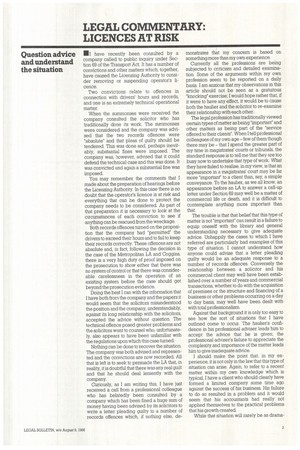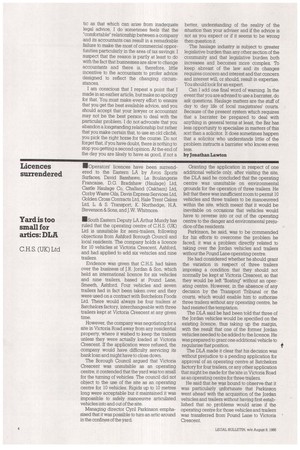Question advice and understand the situation
Page 49

Page 50

If you've noticed an error in this article please click here to report it so we can fix it.
III have recently been consulted by a company called to public inquiry under Section 69 of the Transport Act. It has a number of convictions and other matters which, together, have caused the Licensing Authority to consider removing or suspending operator's licence.
Two convictions relate to offences in connection with drivers' hours and records, and one is an extremely technical operational matter.
When the summonses were received the company consulted the solicitor who has traditionally done its work. The summonses were considered and the company was advised that the two records offences were "absolute" and that pleas of guilty should be tendered. This was done and, perhaps inevitably, substantial fines were imposed. The company was, however, advised that it could defend the technical case and this was done. It was convicted and again a substantial fine was imposed.
You may remember the comments that I made about the preparation of hearings before the Licensing Authority. In this case there is no doubt that the operator's licence is at risk and everything that can be done to protect the company needs to be considered. As part of that preparation it is necessary to look at the circumstances of each conviction to see if anything can be rescued from the wreckage.
Both records offences turned on the proposition that the company had "permitted" the drivers to exceed their hours and to fail to keep their records correctly. These offences are not absolute and, in fact, following the decision in the case of the Metropolitan LA and Coggins, there is a very high duty of proof imposed on the prosecution to show either that there was no system of control or that there was considerable carelessness in the operation of an existing system before the case should get beyond the prosecution evidence.
Doing the best I can with the information that I have both from the company and the papers it would seem that the solicitors misunderstood the position and the company, understandably, against its long relationship with the solicitors, accepted the advice without question. The technical offence posed greater problems and the solicitors went to counsel who, unfortunately, also appears to have been unfamiliar with the regulations upon which this case turned.
Nothing can be done to recover the situation. The company was both advised and represented and the convictions are now recorded. All that is left is to seek to persuade the LA that, in reality, it is doubtful that there was any real guilt and that he should deal leniently with the company.
Curiously, as I am writing this, I have just received a call from a professional colleague who has belatedly been consulted by a company which has been fined a huge sum of money having been advised by its solicitors to write a letter pleading guilty to a number of records offences which, if nothing else, de monstrates that my concern is based on something more than my own experience.
Currently all the professions are being subjected to criticism and detailed examination. Some of the arguments within my own profession seem to be reported on a daily basis I am anxious that my observations in this article should not be seen as a gratuitous "lolocicing" exercise; I would hope rather that, if it were to have any effect, it would be to cause both the haulier and the solicitor to re-examine their relationship with each other.
The legal profession has traditionally viewed certain types of matter as being "important" and other matters as being part of the "service offered to their clients". When I tell professional colleagues of my own age few of them though there may be that I spend the greater part of my time in magistrates' courts or tribunals, the standard response is to tell me that they are too busy now to undertake that type of work. What they have failed to realise, in my view, is that an appearance in a magistrates court may be far more "important" to a client than, say, a simple conveyance. To the haulier, as we all know, an appearance before an LA to answer a call-up letter under Section 69 may well be a matter of commercial life or death, and it is difficult to contemplate anything more important than that.
The trouble is that that belief that this type of matter is not Important" can result in a failure to equip oneself with the library and general understanding necessary to give adequate advice. Unhappily the cases to which I have referred are particularly bad examples of this type of situation. I cannot understand how anyone could advise that a letter pleading guilty would be an adequate, response to a number of records offences. Conversely the relationship between a solicitor and his commercial client may well have been established over a number of years and commercial transactions, whether to do with the acquisition of premises or the structure and financing of a business or other problems occurring on a day to day basis, may well have been dealt with with total professionalism.
Against that background it is only too easy to see how the sort of situations that I have outlined come to occur. The haulier's confidence in his professional adviser leads him to accept the advice that he is given; the professional advisees failure to appreciate the complexity and importance of the matter leads him to give inadequate advice.
I should make the point that, in my experience, it is not only in the law that this type of situation can arise. Again, to refer to a recent matter within my own knowledge which is typical, I have a client who should clearly have formed a limited company some time ago against the success of his business. His failure to do so resulted in a problem and it would seem that his accountants had really not applied themselves to the practical problems that his growth created.
While that situation will rarely be as drama tic as that which can arise from inadequate legal advice, I do sometimes feels that the "comfortable" relationship between a company and its accountants can result in a remarkable failure to make the most of commercial opportunities particularly in the area of tax savings: I suspect that the reason is partly at least to do with the fact that businesses are slow to change accountants and there is, therefore, little incentive to the accountants to profer advice designed to reflect the changing circumstances.
I am conscious that I repeat a point that I made in an earlier article, but make no apology for that. You must make every effort to ensure that you get the best available advice, and you should accept that your lawyer or accountant may not be the best person to deal with the particular problem. I do not advocate that you abandon a longstanding relationship but rather that you make certain that, to use an old cliché, you pick the right horse for the course. Do not forget that, if you have doubt, there is nothing to stop you getting a second opinion. At the end of the day you are likely to have as good, if not a better, understanding of the reality of the situation than your adviser and if the advice is not as you expect or if it seems to be wrong then question it.
The haulage industry is subject to greater legislative burden than any other section of the community and that legislative burden both increases and becomes more complex. To keep abreast of the law and its changes requires concern and interest and that concern and interest will, or should, result in expertise. You should look for an expert.
Can I add one final word of warning. In the event that you are advised to use a barrister, do ask questions. Haulage matters are the stuff of day to day life of local magistrates' courts. Because of the present system which requires that a barrister be prepared to deal with anything in general terms at least, the Bar has less opportunity to specialise in matters of this sort than a solicitor. It does sometimes happen that a solicitor who understands little of the problem instructs a barrister who knows even less.
by Jonathan Lawton




































































































